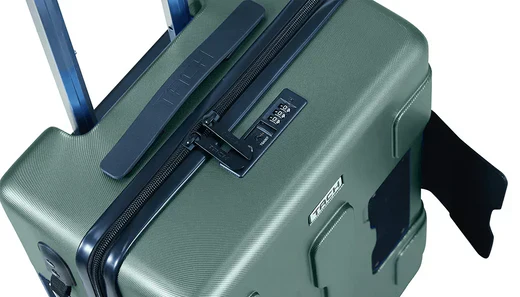Should I lock my luggage when I fly?

Yes, locking your luggage when you fly can provide an extra layer of security and peace of mind.
Why should I lock my luggage when I fly?
Locking your luggage provides an extra layer of security when traveling. By locking your bags, you reduce the risk of unauthorized access and theft of your personal belongings.
This is particularly important in crowded airports where your luggage may be left unattended for short periods of time.
Can I use any lock for my luggage?
No, not all locks are suitable for air travel.
Ideally, it’s best to use TSA-approved locks when flying, especially in the United States. TSA-approved locks allow airport security personnel to open and inspect your luggage without damaging the lock.
These locks have a special mechanism that can be opened by the Transportation Security Administration (TSA) using a universal master key.
If you use a lock that is not TSA-approved, there is a possibility that security personnel may need to break it if they need to inspect your luggage. TSA-approved locks are identified by a red diamond symbol and are widely available in stores and online.
Can TSA-approved locks be used for international travel?
TSA-approved locks are primarily designed for travel in and out of the United States, where the TSA operates. However, many other countries’ security agencies use similar master keys to open these locks.
While there is no universal guarantee that every country’s airport security will use TSA locks, most major airports around the world have tools to access them.
For international travel, it’s still recommended to use TSA-approved locks as they offer the most flexibility. Even if an airport security officer doesn’t have the necessary tools to open the lock, they will likely be more familiar with it and handle your luggage more carefully.
What are the risks of locking my luggage?
While locking your luggage can improve security, it’s important to recognize that locks aren’t foolproof.
Experienced thieves may still find ways to break into your luggage, especially if the lock is cheap or poorly constructed.
Another risk of locking your luggage is that it may give a false sense of security. While locks can deter casual tampering, they may not protect valuable items.
It’s always a good idea to keep high-value belongings, like electronics, money, and important documents, in your carry-on luggage rather than in checked bags, regardless of whether your luggage is locked.
Are there alternatives to locking my luggage?
If you're unsure about locking your luggage or prefer not to, there are several alternative ways to keep your belongings secure while flying.
- Use a luggage strap: A durable luggage strap can provide additional security and prevent your suitcase from accidentally opening during transit. While it may not prevent theft, it adds another layer of protection.
- Opt for hard-shell luggage: Hard-shell suitcases offer more security than soft-shell luggage because they are harder to puncture or cut open. They also generally come with built-in locks.
- Track your luggage: Consider using GPS tracking devices, like an AirTag or Tile, to keep track of your luggage. This won’t prevent theft, but it can help you locate your bag if it gets lost or stolen. For a simple and effective solution, QR code tags for lost and found items can be an excellent alternative. These tags make it easy for anyone who finds your luggage to scan the code and contact you securely, ensuring a higher chance of recovering your belongings.
What items should I avoid putting in checked luggage, even if it’s locked?
Even if your luggage is locked, certain items should never be placed in checked baggage due to the risk of theft or damage. These items include:
- Valuables: Jewelry, expensive electronics, and other high-value items should always be carried in your hand luggage.
- Important documents: Passports, boarding passes, IDs, and other important documents should remain with you at all times.
- Medication: Always carry essential medications in your carry-on in case your checked luggage is delayed or lost.
- Cash and credit cards: Keep your wallet, cash, and credit cards on your person or in your carry-on.
What should I do if my locked luggage is damaged or tampered with?
If you find that your locked luggage has been damaged or tampered with after a flight, the first step is to inspect the contents and check for missing items.
If you notice any issues, immediately report it to the airline’s customer service desk. Many airlines have procedures in place for reporting lost, stolen, or damaged items, and filing a claim as soon as possible increases the likelihood of compensation.
If your lock was broken by airport security, there is usually a notification inside your bag explaining the reason for inspection.
If there was no reason for the damage or if you suspect tampering by unauthorized individuals, document the damage with photos and keep all receipts, including those for any broken locks, as this can help support your claim.

